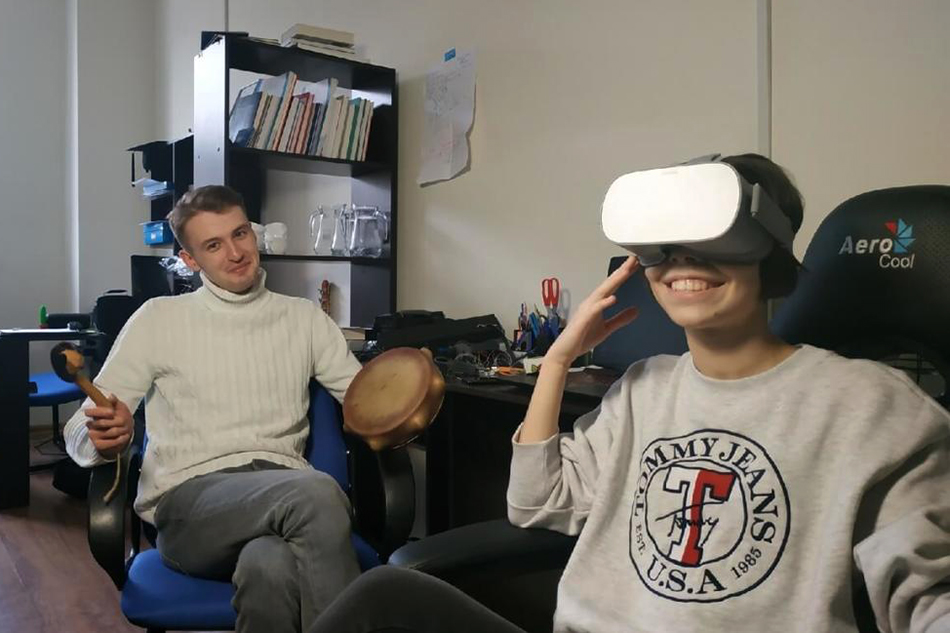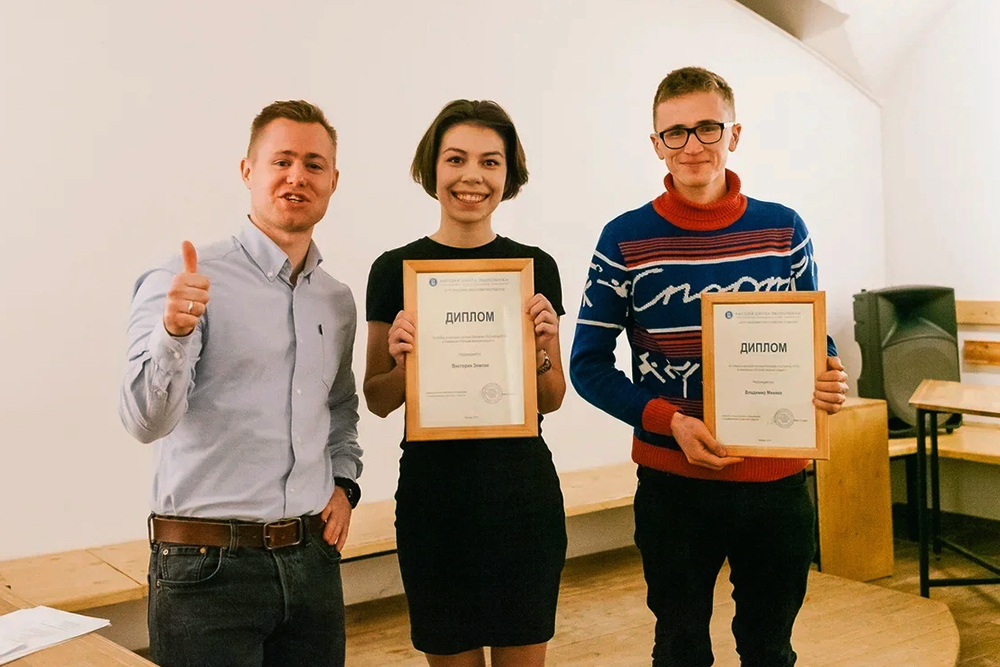‘We Want to Talk About How the Human Brain and Machine Intelligence Work’

In a competition for science bloggers held at HSE University, Vladimir Mikheev and Vikotria Zemlyak were among the top performers. The students of the English-taught Master’s programme ‘Cognitive Sciences and Technologies: From Neuron to Cognition’ produce ‘Neirochai’ (‘NeuroTea’), a science podcast. The duo spoke with the HSE News Service about their guests, their listeners and their future plans.
How did you come up with the idea to create a podcast? And why? Were you looking for another way to spend your time?
Vladimir: I am engaged in an interesting area—the study of the human brain. I always wanted to tell other people about my findings. When Vika and I heard about the podcast contest, we jumped at the opportunity.
But does it take a lot of time and effort?
Vladimir: Yes. I very well might not receive a red diploma because of this podcast. But it gives me something else that is no less important: I can talk with experts face-to-face and talk about what I care about. Anything is hard to do alone. The podcast seems to be something light and fun, but we have invested a lot of work in it together. I doubt that we would have accomplished what we have working individually.
Victoria: The idea came to us randomly. My wifi wasn’t working, and I was clicking on a page over and over. When the internet started working again, I accidentally ended up on the registration page for the science blogger competition. I used to work in radio at another HSE campus. I liked the process of preparing for an episode, recording and working in the studio. And the podcast was a chance to return to something I loved. But it does take up a lot of time. Working together makes it easier and more interesting.
 Vikotria Zemlyak and Vladimir Mikheev with winner certificates
Vikotria Zemlyak and Vladimir Mikheev with winner certificates
What’s your target audience? And is it easy to find guests who can easily maintain a substantive conversation for a long time?
Vladimir: We want to talk about how the human brain and machine intelligence work, so we invite some guests from cognitive and neuroscience and others from programming. It’s ideal when guests are well versed in both areas. Before the episode, we conduct a kind of background check; we listen to how our guest speaks and conducts him or herself in public forums. We try to invite professionals who are good speakers. Those who are engaged in breakthrough things can usually speak well. For the time being, a large part of our audience are people directly connected with the cognitive sciences. But we hope to get beyond the limits of this immediate circle and reach people who are fascinated by the brain in general.
Victoria: At first, we didn’t really know who would listen to us. We were guided by what we ourselves found interesting and drew up a rough plan for ten episodes. We searched through people in labs and research centers we knew. We wrote down their names, looked at their publications and their webpages. Now the podcast is a part of our lives and when I meet an interesting lecturer at a conference or school, I immediately think about whether we should invite them to our podcast. You can engage any introvert in conversation if you are talking about something they find interesting.
When recording the podcast, do you let the guest determine the course of the conversation? Or do you keep to a certain framework, focusing on what you personally find interesting?
Victoria: We always have a clear list of questions that we follow during the interview. We send it to the guest in advance so that they can prepare.
Vladimir: This is very important. Listening to scientific explanations is already difficult, so if the interview isn’t structured, it just turns into a jumble of words. Whenever a guest mentions a new term, we always make sure they explain it, so that the listener can follow with ease.
You probably studied various other scientific podcasts when you were conceiving your own. Did you find models exhibiting a standard that you wanted to meet?
Vladimir: We wanted to avoid abstruse lectures like those in ‘Postnauka’ (‘Post-Science’). Conversations about science should be engaging, where the participants can joke and ask questions, be surprised or become inspired. What wanted to address topics that are often glossed over in projects like this: the career prospects of scientists, unethical scientific practices, how to be successful in science or in tech business. Out of the science podcasts that are out there, I like ‘Medach’ (__) and ‘Kritmysh’’ (‘Crit-Mouse’). They are about research as well as the daily sorrows and joys of both scientists and ordinary people.
Victoria: You can emulate not only scientific podcasts. For example, we both listen to Medusa. I like the way several hosts interact there. Their disputes, discussions, and comments during the episode—all of these are great ways to present information in a more lively and interesting way.
How often do you plan to record your podcast episodes? What are the next topics and guests?
Vladimir: We have three episodes ready so far, and we are planning to record ten. That will round out our first season. If things go well, we’ll continue. We try to do one episode every two weeks, and we more or less make it work.
Have you gotten any feedback from listeners yet?
Vladimir: We are responsive to criticism and try to find out what our listeners liked or didn’t like.
Victoria: There is also indirect feedback, like the number of subscribers, likes, and listens. We try to remember new subscribers, see which issues are more interesting for them. Sometimes we study their pages in order to better know our audience. One of our first subscribers who was not one of our friends and acquaintances was a little girl. Her VKontakte profile is called Escobar's Cat, and she is interested in science and posts photos with nature and kittens. When a complex term or theory appears in an episode, we try to explain it in such a way that every listener can understand. We are listened to by children whom we can attract and engage with science, and this is very good feedback.
Admissions to Master’s programme in Cognitive Sciences and Technologies are open. International students can apply online. To learn more about HSE University, its admission process, or life in Moscow, please visit International Admissions website, or contact the Education & Training Advisory Centre at: inter@hse.ru, or via WhatsApp at: +7 (916) 311 8521.
See also:
HSE Researchers Discover Simple and Reliable Way to Understand How People Perceive Taste
A team of scientists from the HSE Centre for Cognition & Decision Making has studied how food flavours affect brain activity, facial muscles, and emotions. Using near-infrared spectroscopy (fNIRS), they demonstrated that pleasant food activates brain areas associated with positive emotions, while neutral food stimulates regions linked to negative emotions and avoidance. This approach offers a simpler way to predict the market success of products and study eating disorders. The study was published in the journal Food Quality and Preference.
HSE Neurolinguists Create Russian Adaptation of Classic Verbal Memory Test
Researchers at the HSE Centre for Language and Brain and Psychiatric Hospital No. 1 Named after N.A. Alexeev have developed a Russian-language adaptation of the Rey Auditory Verbal Learning Test. This classic neuropsychological test evaluates various aspects of auditory verbal memory in adults and is widely used in both clinical diagnostics and research. The study findings have been published in The Clinical Neuropsychologist.
Researchers at HSE Centre for Language and Brain Reveal Key Factors Determining Language Recovery in Patients After Brain Tumour Resection
Alina Minnigulova and Maria Khudyakova at the HSE Centre for Language and Brain have presented the latest research findings on the linguistic and neural mechanisms of language impairments and their progression in patients following neurosurgery. The scientists shared insights gained from over five years of research on the dynamics of language impairment and recovery.
Neuroscientists Reveal Anna Karenina Principle in Brain's Response to Persuasion
A team of researchers at HSE University investigated the neural mechanisms involved in how the brain processes persuasive messages. Using functional MRI, the researchers recorded how the participants' brains reacted to expert arguments about the harmful health effects of sugar consumption. The findings revealed that all unpersuaded individuals' brains responded to the messages in a similar manner, whereas each persuaded individual produced a unique neural response. This suggests that successful persuasive messages influence opinions in a highly individual manner, appearing to find a unique key to each person's brain. The study findings have been published in PNAS.
'We Are Creating the Medicine of the Future'
Dr Gerwin Schalk is a professor at Fudan University in Shanghai and a partner of the HSE Centre for Language and Brain within the framework of the strategic project 'Human Brain Resilience.' Dr Schalk is known as the creator of BCI2000, a non-commercial general-purpose brain-computer interface system. In this interview, he discusses modern neural interfaces, methods for post-stroke rehabilitation, a novel approach to neurosurgery, and shares his vision for the future of neurotechnology.
Smoking Habit Affects Response to False Feedback
A team of scientists at HSE University, in collaboration with the Institute of Higher Nervous Activity and Neurophysiology of the Russian Academy of Sciences, studied how people respond to deception when under stress and cognitive load. The study revealed that smoking habits interfere with performance on cognitive tasks involving memory and attention and impairs a person’s ability to detect deception. The study findings have been published in Frontiers in Neuroscience.
'Neurotechnologies Are Already Helping Individuals with Language Disorders'
On November 4-6, as part of Inventing the Future International Symposium hosted by the National Centre RUSSIA, the HSE Centre for Language and Brain facilitated a discussion titled 'Evolution of the Brain: How Does the World Change Us?' Researchers from the country's leading universities, along with health professionals and neuroscience popularisers, discussed specific aspects of human brain function.
‘Scientists Work to Make This World a Better Place’
Federico Gallo is a Research Fellow at the Centre for Cognition and Decision Making of the HSE Institute for Cognitive Research. In 2023, he won the Award for Special Achievements in Career and Public Life Among Foreign Alumni of HSE University. In this interview, Federico discusses how he entered science and why he chose to stay, and shares a secret to effective protection against cognitive decline in old age.
'Science Is Akin to Creativity, as It Requires Constantly Generating Ideas'
Olga Buivolova investigates post-stroke language impairments and aims to ensure that scientific breakthroughs reach those who need them. In this interview with the HSE Young Scientists project, she spoke about the unique Russian Aphasia Test and helping people with aphasia, and about her place of power in Skhodnensky district.
Neuroscientists from HSE University Learn to Predict Human Behaviour by Their Facial Expressions
Researchers at the Institute for Cognitive Neuroscience at HSE University are using automatic emotion recognition technologies to study charitable behaviour. In an experiment, scientists presented 45 participants with photographs of dogs in need and invited them to make donations to support these animals. Emotional reactions to the images were determined through facial activity using the FaceReader program. It turned out that the stronger the participants felt sadness and anger, the more money they were willing to donate to charity funds, regardless of their personal financial well-being. The study was published in the journal Heliyon.


